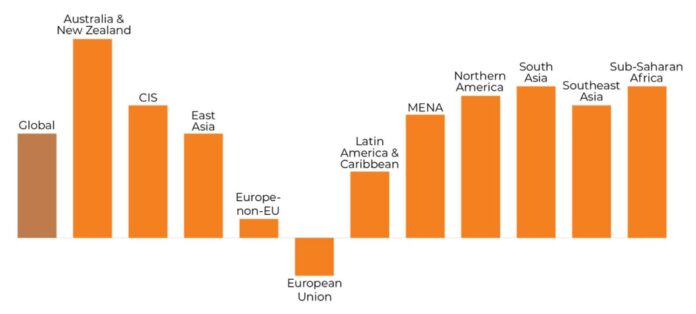Gallup-led meta-analysis has established a new framework for understanding the strong link between spirituality and religion and better global wellbeing from 10 years of World Poll data.
On the eve of World Mental Health Day, Radiant Foundation’s Faith & Media Initiative partnered with Gallup to launch Faith and Wellness: The Worldwide Connection Between Spirituality & Wellbeing report, a meta-analysis of academic and Gallup global data that uncovers ways in which spirituality can help address the global mental health crisis. An analysis of World Poll data over ten years, over 140 countries, and approximately 1.47 million people interviewed, shows a strong association between religiosity and wellbeing. Gallup indexes that measure positive emotions, social life, optimism, and community engagement show a positive relationship between religiosity – defined by the importance of religion in one’s daily life – and wellbeing outcomes.
Among the findings worldwide, those who say religion is important to them are more likely to be civically engaged, per Gallup’s Civic Engagement Index. This index assesses people’s inclination to volunteer their time and assistance to others. Additionally, approximately 100 million more people who identify as religious have others they can turn to in times of need than would be the case if they were not religious. According to the report’s Positive Experience Index, an estimated 160 million more adults worldwide have positive experiences than would be the case if those adults were not religious.
As part of the research, Gallup reviewed existing literature and conducted in-depth interviews with leaders in the field to develop a new framework that identifies five key factors of spirituality that positively impact wellbeing:
(1) Positive coping and a sense of purpose in life.
(2) Faith-based social connections.
(3) Community and civic engagement.
(4) Structural stability. 5) Workplace support of holistic wellbeing.
“As you develop your support network and as you are making active efforts to support others – it comes back to you, that’s the way the world is structured. If you’re caring for others in a non-selfish way, an unconditional way, it provides stability in your own life”, said Harold Koenig, Professor of Psychiatry & Behavioral Sciences, at Duke University School of Medicine. “Religion is available to anyone at any time, regardless of financial, social, physical, or mental circumstances.”
“We are facing a worldwide mental health crisis, and we can’t afford to overlook any aspect of life or activity that can improve wellbeing,” said Aaron Sherinian, Radiant Foundation’s CEO. “Until recently, most data of this kind asked only elementary questions about spiritual practice. This more expansive measure will help us truly understand how factors of faith and spirituality can strengthen mental health. This study gives us a new framework for how those factors are connected and a more nuanced and comprehensive understanding of religious observance, spirituality and wellbeing.”
While scholarship and analysis detailed in the report illustrate that there is often a positive relationship between spirituality and wellbeing, the relationship is complex. An analysis of 2012-2022 Gallup World Poll data shows that spirituality and various wellbeing outcomes differ broadly at the global level. Overall, religious people tend to score better on Gallup’s Positive Experience Index than non-religious people, as well as its Social Life, Community Basics and Optimism indexes. This positive effect for religious people is compounded when they live in more religious countries.
“While the connection between religion, spirituality and wellbeing is widely recognized, there are still uncharted territories requiring deeper investigation,” said Ilana Ron-Levey, Gallup Managing Director. “Many individuals may not fully appreciate the positive impact that spiritual life and practices can have on their mental and physical wellbeing, and this study further uncovers the complex interplay between spirituality and wellbeing across countries and regions.”
The report also poses the question of how workplaces might incorporate elements of spirituality into employee wellbeing programs, given the U.S. Surgeon General’s recent report emphasizing the importance of workplaces focusing on employee well being.
“One of the newer ‘hot topics’ that employers are wrestling with is how to respond to the faith at work movement, where employees of all traditions are increasingly wanting to bring their whole self to work, including their spiritual identity,” said David Miller, Ph.D., Director, Princeton University Faith & Work Initiative. “Faith and spirituality need to be an integral part of any organization’s Diversity, Equity, and Inclusion efforts.”
The Radiant Foundation’s mission is to cultivate a more personal, positive place for faith in modern society. It’s working to shift culture and change lives by fostering a more accurate, diverse representation of faith in news and entertainment, helping people develop a meaningful, personal relationship with God and healing divisions, promoting understanding and inspiring meaningful exchange about spirituality.
Gallup delivers analytics and advice to help leaders and organizations solve their most pressing problems. Combining more than 80 years of experience with its global reach, Gallup knows more about the attitudes and behaviors of employees, customers, students and citizens than any other organization in the world.






